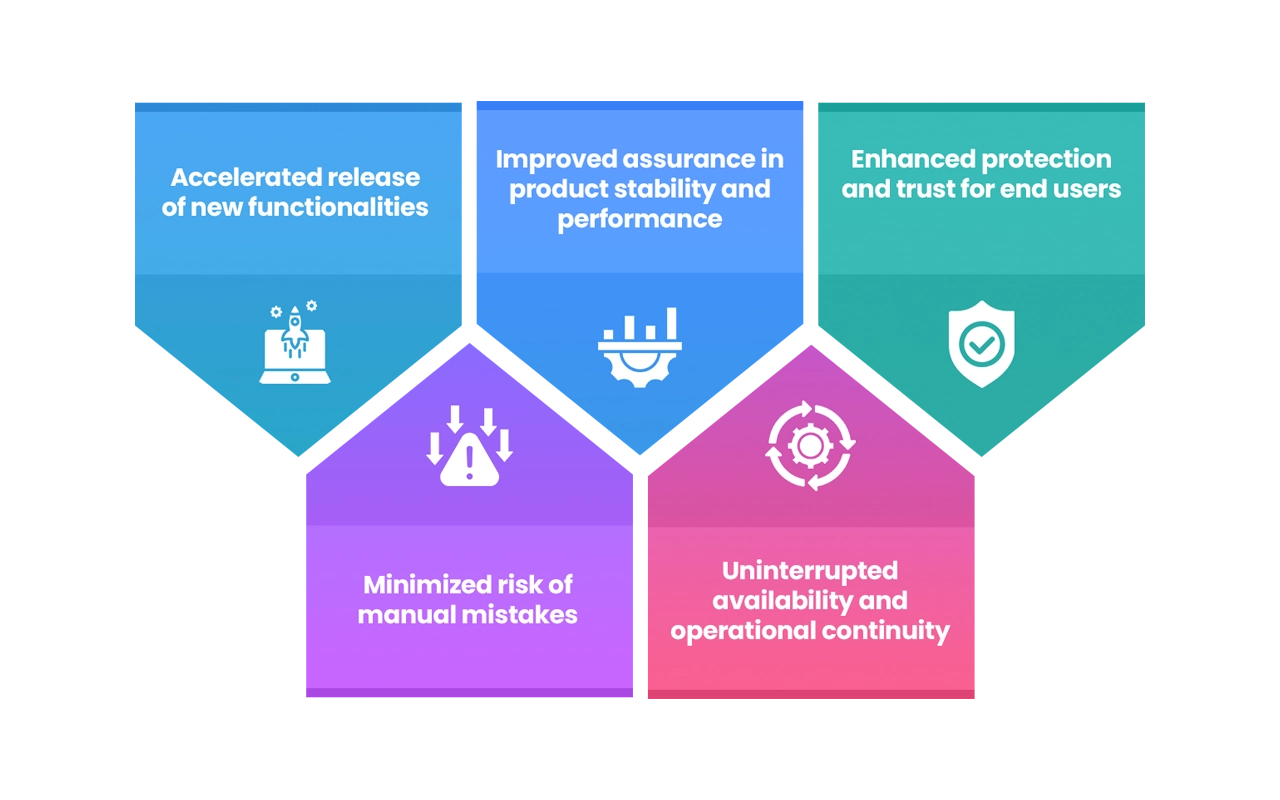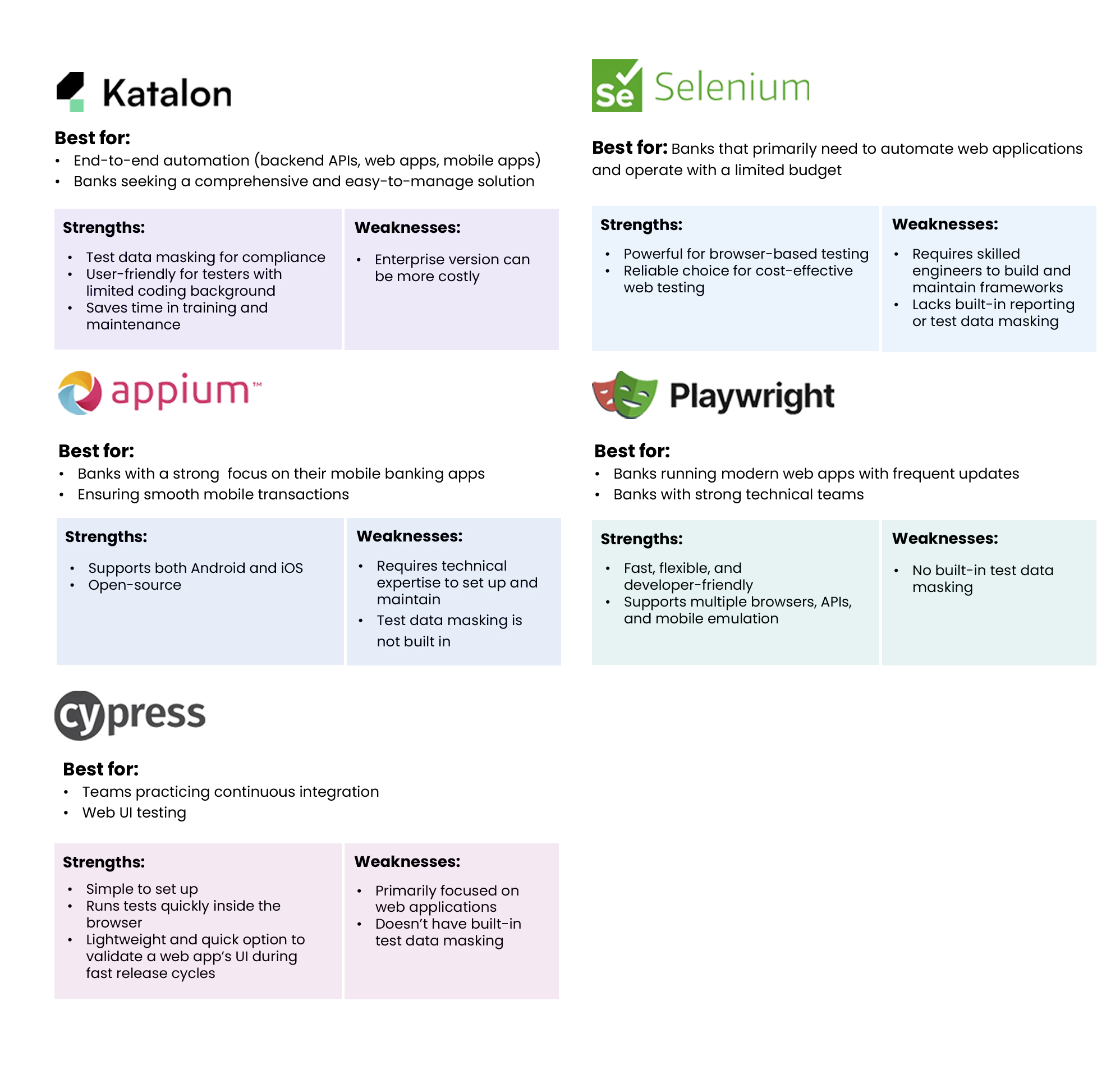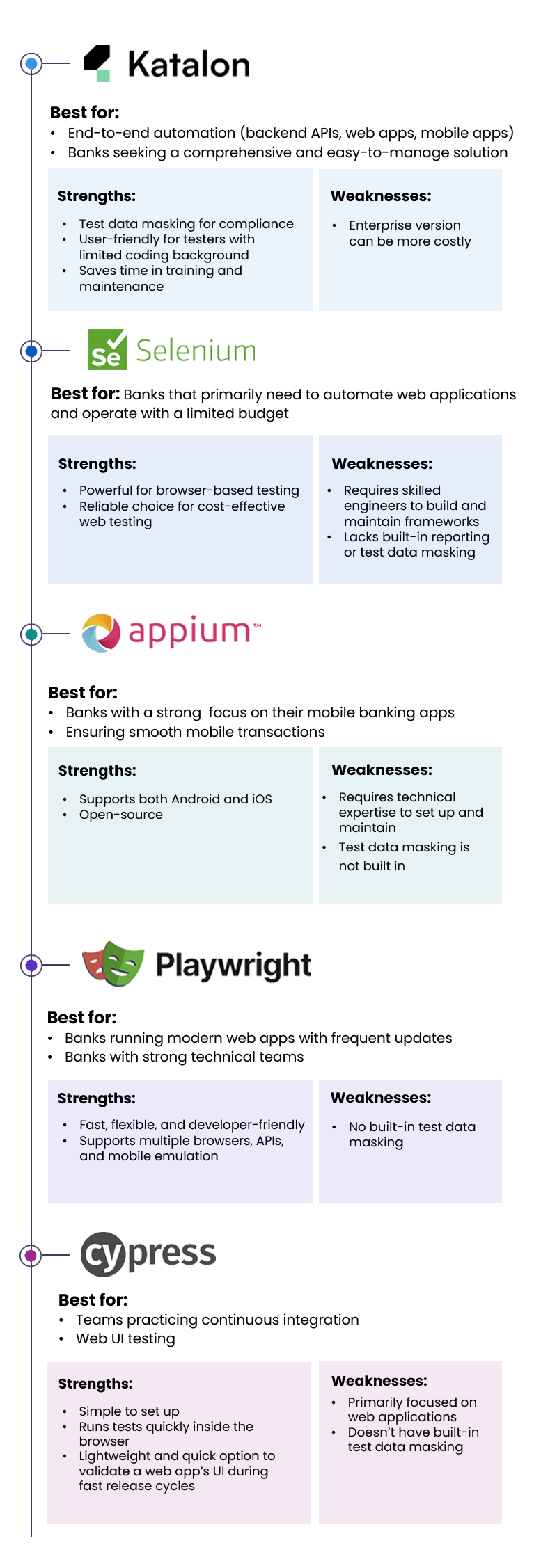In the digital-first age, banks are under pressure to deliver updates as rapidly as fintechs, all while upholding quality, accuracy, and compliance. However, many still rely heavily on manual testing, which often turns QA into a bottleneck rather than a business accelerator. 86% of software development leaders say that their mainframe teams dedicate a significant time to code testing due to the increasing complexity of banking application environments.
Test automation empowers banks to transition from slow, reactive QA to agile, scalable quality engineering. This shift enables smarter, faster, and more accurate testing with fewer errors. However, successful automation depends on choosing the right tools for your specific banking environment. Drawing on insights from the Stratpoint QA team, we evaluate the leading test automation tools we utilize and key considerations before implementation.
Why Test Automation Matters More in Banking
As banks increasingly adopt and depend on digital platforms like web and mobile applications, the demand for a seamless, secure, and always-available experience intensifies. In this context, test automation becomes not only a technical necessity but also a strategic enabler of operational efficiency, customer trust, and competitive agility. Here’s why:
Imagine a major bank’s online system crashing for just two hours on payday. If 10,000 attempted transactions, each worth Php 5,000, failed, that would amount to Php 50 million in delayed or lost transactions, with the added risk of bank penalties and regulatory issues.
Test automation helps prevent such scenarios by enabling instant smoke tests after deployment. These tests ensure critical features like bank transfers, login, or balance checks remain functional, significantly reducing post-deployment issues and downtime.
Banking is built on trust and accuracy. Even a Php 0.01 error, if repeated across thousands of transactions, can lead to substantial financial discrepancies. Automated tests run repeatedly with consistent accuracy, allowing for earlier and faster detection of issues, thereby safeguarding against compounding risk.
Banks and financial institutions are now releasing updates more frequently, whether for new features (e.g., QR code payments) or security patches. Test automation complements manual testing by streamlining regression testing, freeing QA teams to focus on developing new features instead of spending weeks on old test cases. This approach allows banks to maintain agility while upholding high standards.
Key Benefits of Test Automation
In banking, where accuracy, speed, and availability are paramount, test automation delivers:
Stratpoint’s Top Test Automation Tools
Not all banks have identical test automation needs. Some require full end-to-end coverage, while others only need to test specific parts of their system. Choosing the right tool depends on factors such as budget, platforms to test, frequency of updates, security, and ease of maintenance. We asked our Test Automation team members: “What tools work best in test automation in banking?” Here’s what they shared, based on real client projects and team experience.

Best Practices for Scaling Test Automation
For Stratpoint Head of QA Business, Lyndon Catalan, effective test automation implementation requires a strategic approach. Stratpoint QA has supported enterprise clients throughout their test automation journeys. Lyndon shares some strategic tips from the QA team:- Choose tools with strategy, not just popularity: : Tool selection should align with your long-term QA strategy, team skillset, and system architecture. The right tool supports, rather than defines, your automation success.
- Start with small, high-value flows: Begin by targeting high-impact, frequently executed, and stable test cases. Logins, transactions, and form submissions provide early wins and demonstrate tangible ROI.
- Embrace data-driven testing:This is especially crucial for rule-based banking systems like credit scoring or fraud detection. Data-driven testing allows you to run a single test script with multiple sets of input data, comprehensively validating various scenarios.
- Automate across layers: Modern banking apps are multi-tiered. Automate tests across critical layers: the UI, the underlying APIs that power functionality, and mobile apps.
- Tie automation to CI/CD: Seamlessly embed test automation into your CI/CD pipelines to ensure every code commit triggers automated tests, providing immediate feedback and catching defects early.
- Monitor and adapt: Regularly review test results to identify recurring regression trends, pinpoint flaky tests, and refine product development and QA strategy. These insights inform broader decisions around tooling, coverage priorities, and team workflows.
- Think beyond testing: Automation also improves traceability, audit-readiness, and internal reporting, which are vital in regulated industries like banking.
“In every banking project we support, we remind our clients: quality starts with us, not just as QA professionals, but as a team working across roles. Test automation makes that collaboration more consistent, traceable, and scalable.”
– Lyndon Catalan, Stratpoint Head of QA Business Automate Smarter for an Accelerated Banking QA
There is no one-size-fits-all approach in selecting the right test automation tools. Stratpoint QA’s recommended stack often depends on the client’s existing infrastructure and team skillset. For instance, Katalon has proven effective for clients with mixed QA teams, reducing onboarding time even for non-technical testers, allowing them to contribute to automation efforts much faster. For projects demanding deep customization and complex integrations, a combination like Selenium and TestNG for structured testing in Java environments provides the flexibility and power needed.
Beyond testing faster, test automation in banking helps ensure the delivery of better, safer, and smarter software. With the right tools, strategy, and expert partners, QA becomes a catalyst for innovation.
Explore what your bank can achieve with modern QA. Fill out the form below to schedule a discovery call with #StratpointQA experts.




